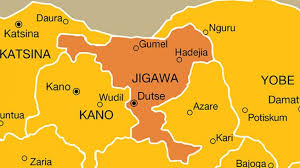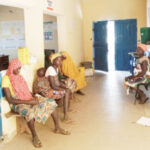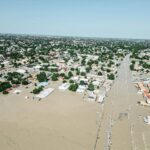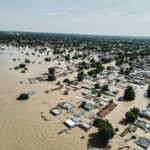Unknown and isolated by circumstances of environment, poor governance and sub-optimal representation, the Takazza community in Guri LGA of Jigawa is a prototype of the misery that afflicts many others in the North East zone of the state.
Shortly after its recovering from a massive flood that cut it off from the state (Jigawa) barely three months ago, Takazza is today sadly threatened by bloodbath and parts of it razed to ashes by arsonists who herded away animals as well. Few communities have suffered the same mishap as much and as frequently too.
I have had cause to have a rapport with its resilient people twice in September this year. The first was to respond to their emergency request for empty sacks to enable them to curtail surging floodwaters from what is left of their homesteads and food. The water had taken over their schools and hospital buildings and already destroyed all they had planted and washed away even the community burial ground.
My second encounter, a few days later, was a dramatic and adventurous one with a touch of bad risk to it. The locals demanded that I personally visit to identify with them. I conceded and took about an hour of perilous canoe ride in very deep waters with no protection of any form (a story for another day).
- FG wrong to blame governors for poverty level – Ex-NHIS boss
- 2023: Shari’ah centre seeks protection of Muslims’ rights in S/West, others
I was moved to tears when two parents casually pointed at the exact point their grown-up children drown and disappeared just days before my visit during the floods of early September.
The same day also, the chief Imam of Takazza had to endure an hour’s ride in a rickety canoe to reach the shores when he took ill, he didn’t make it back. Not many people from Takazza will get the opportunity to pay their last respects. He was buried in the highlands.
Again, what started as isolated clashes around the farmlands of Takazza and its environs (i.e. between the farmers who tend to what was left of their crops after the floods and the herders too desperate to feed their herds) is unfortunately fast degenerating into a major conflict.
Parts of the community are plagued with deadly injuries and major threats to peace due to different but interrelated reasons. These have forced the community to evacuate its women and children for the second time in three months.
A combination of poverty, ignorance, environmental vulnerabilities and bad politics has overwhelmed our people into submission. But thank God, some measure of citizens’ action, surveillance and participation is building up.
While it is probably true that the frequent security breaches around Guri and Kirikasamma may be entirely local and longstanding, it is also a fact that it has increased in both scale and intensity. Sophisticated weapons are freely deployed and more casualties are being recorded.
The general national security outlook and other vulnerabilities might also interlink, connect and turn the wetlands into yet another battleground if our responses continue to be knee-jerk, superficial and largely driven by very narrow political considerations.
We may accordingly need to be mindful of the possibility that this ‘normal’ conflict could transform before our very eyes (God forbid), into a major transnational conflict involving mercenaries, sophisticated arms and complicit and incompetent authorities.
Takazza, like the rest of the Hadejia Valley, is a case study in the management of prosperity. With an abundance of water, forest resources and unusually fertile land, the urgent task should be to recalibrate our politics and quality of governance to match these opportunities; else they (like in so many other places) become a curse.
People cannot lose everything (farms, animals, homesteads) to preventable floods, and at the same time lose their peace and entire existence to marauders.
Moving forward, our local community security architecture and resilience system must be carefully reexamined, strengthened and enabled. Existing laws shall be given the teeth to bite as hard as they can until they draw some blood. Governance and representation should be sincere, knowledge-driven and competent.
Modern management of perennial floods and frequent breakdown of law and order occasioned by climate change, availability of forest resources, fertile land and water would need a more advanced political value system and culture with the capacity to seamlessly network itself within the wider national and global security and environmental resource framework and consciousness.
Dr Nuruddeen Muhammad, is a former Minister of State for Foreign Affairs and Minister of Information

 Join Daily Trust WhatsApp Community For Quick Access To News and Happenings Around You.
Join Daily Trust WhatsApp Community For Quick Access To News and Happenings Around You.

